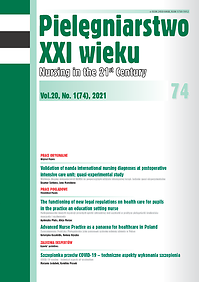Hand hygienic disinfection of nurses - knowledge and its practical use
DOI:
https://doi.org/10.2478/pielxxiw-2021-0003Keywords:
hygienic hand disinfection, nurses, qualityAbstract
HAND HYGIENIC DISINFECTION OF NURSES - KNOWLEDGE AND ITS PRACTICAL USE
Aim. To find out the level of theoretical knowledge of nurses working in the internal medicine and surgical wards about hygienic hand disinfection and to evaluate its application during work performance.
Material and methods. A questionnaire was conducted, supplemented by observations with records in the observation sheets. The group of respondents consisted of 60 nurses working in the internal medicine and surgical wards.
Results. The theoretical knowledge of a selected sample of nurses reaches an average level. The observations have proved that nurses do not put emphasis on hygienic hand disinfection during everyday activities and the level of quality of hygienic hand disinfection is low.
Conclusions. Hygienic hand disinfection is one of the important indicators of the quality of the health care provided. It is necessary to increase the level of the theoretical knowledge of healthcare professionals and, at the same time, to enable healthcare professionals to practise hygienic hand disinfection and to provide efficient feedback.
References
1. Krajská hygienická stanice libereckého kraje se sídlem v Liberci. Infekce spojené se zdravotní péčí – hrozba pro bezpečnost pacientů v Evropě. 2018, [cit. dne 2.3.2020]. Available: https://www.khslbc.cz/wp-content/uploads/Poster_inf_zdravotni_pece_18.pdf.
2. World Health Organization. WHO guidelines on hand hygiene in health care. First global patient safety challenge clean care is safer care. 2009, [cit. dne 18.2.2020]. Available: https://apps.who.int/iris/bitstream/handle/10665/44102/9789241597906_eng.pdf;jsessionid=736E1CBA42F40732E0162127EC3302F4?sequence=1.
3. Reichardt Ch, Bunte-Schönberger K, Van Der Linden P. Hygiena a dezinfekce rukou: 100 otázek a odpovědí. 2. vyd. Praha: Grada Publishing, 2017.
4. Graveto JMGN, Rebola R, Fernandes E et al. Hand Hygiene: nurses´ adherence after training. Rev Bras Enferm. 2018; 71(3): 1189-1193.
5. Hutzschenreuter L, Hübner NO, Dittmann K, et al. Potential of innovations in hygiene management – a managerial perspective. Antimicrobial Resistance and Infection Control. 2019; 8: 100-110.
6. Jeansen A, Coen PG, Drey NS, et al. The development of hand hygiene compliance imperatives in an emergency department. American Journal of Infection Control. 2018; 46(4): 441-447.
7. Randle J, Arthur A, Vaughan N. Twenty-four.hour observational study of hospital hand hygiene compiliance. J Hosp Infect. 2010; 76: 252-255.
8. Erkan T, Findik UY, Tokuc B. Hand-washing behaviour and nurses´ knowledge after a training programme. International journal of nursing practice. 2011; 17: 464-469.
9. Freeman JT, Dawson L, Jowitt DM, et al. The impact of the Hand Hygiene New Zealand programme on hand hygiene practices in New Zealand´s public hospitals. NZMA. 2016; 129(1443): 67-76.
10. Assadollahi M, Bostanabad MA, Jebrailli M, et al. Nurses´Knowledge Regarding Hand Hygiene and Its Individual and Organizational Predictors. Journal of Caring Sciences. 2015; 4(1), 45-53.
11. Polat S, Gurol AP, Cevik U. Hand hygiene compiliance of nurses: A 5 – unit observational study in North-Eastern Anatolia. International Journal of Nursing Prac. 2011; 17: 435-440.
12. Boudjema S, Reynier P, Dufour JC, et al. Hand Hygiene Analyzed by Video Recording. J Nurs Care. 2016; 5: 338.
13. Hammerschmidt J, Manser T. Nurses´ knowledge, behaviour and compiliance concerning hand hygiene in nursing homes: a cross-sectional mixed-methods study. BMC Health Servises Research. 2019; 19: 547.
14. Harada C, Tani A, Goto A. Education on hand didinfectio focusing on five important timing. 2018, [cit. dne 10.4.2020]. Available: https://tokushima.hosp.go.jp/files/000060672.pdf.
15. Hoffmann M, Sendlhofer G, Gombotz V, et al. Hand hygiene compliance in intensive care units: An observational study. International Journal of Nursing Practise. 2019; 26(2): 1-8.
16. Scheithauer S, Balzer B, Dangel M, et al. Workload even affects hand hygiene in a higly trained and well-staffed setting: a prospective 365/7/24 observational study. J Hosp Infect. 2017; 97(1):11-16.
17. Sadule-Rios N, Aguilera G. Nurses´ perceptions of reasons for persistent low rates in hand hygiene compliance. Intensie Crit Care Nurs. 2017; 42: 17-21.
18. Manomenidis G, Panagopoulou E, Montgomery A. Job Burnout Reduces Hand Hygiene Compiliance Among Nursing Staff. J Patient Saf. 2019; 15(4): 70-73.
Downloads
Published
Issue
Section
License
Copyright (c) 2021 Authors

This work is licensed under a Creative Commons Attribution-NonCommercial-NoDerivatives 4.0 International License.




